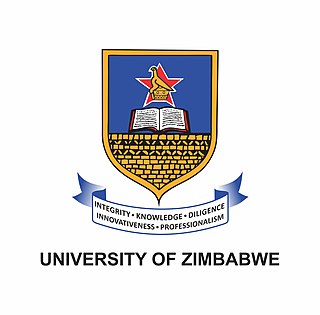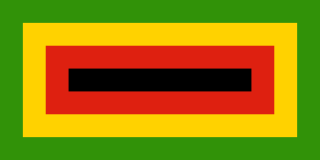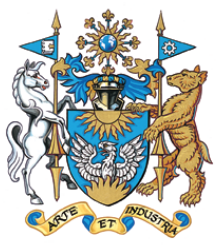
A college is an educational institution or a constituent part of one. A college may be a degree-awarding tertiary educational institution, a part of a collegiate or federal university, an institution offering vocational education, a further education institution, or a secondary school.

The University of Zimbabwe (UZ) is a public university in Harare, Zimbabwe. It opened in 1952 as the University College of Rhodesia and Nyasaland, and was initially affiliated with the University of London. It was later renamed the University of Rhodesia, and adopted its present name upon Zimbabwe's independence in 1980. UZ is the oldest university in Zimbabwe.

The Zimbabwe African National Union – Patriotic Front (ZANU–PF) is a political organisation which has been the ruling party of Zimbabwe since independence in 1980. The party was led for many years by Robert Mugabe, first as prime minister with the Zimbabwe African National Union (ZANU) and then as president from 1987 after the merger with the Zimbabwe African People's Union (ZAPU) and retaining the name ZANU–PF, until 2017, when he was removed as leader.

Bulawayo is the second largest city in Zimbabwe, and the largest city in the country's Matabeleland region. The city's population is disputed; the 2022 census listed it at 665,940, while the Bulawayo City Council claimed it to be about 1.2 million. Bulawayo covers an area of 546 square kilometres in the western part of the country, along the Matsheumhlope River. Along with the capital Harare, Bulawayo is one of two cities in Zimbabwe that are also provinces.

Joshua Mqabuko Nyongolo Nkomo was a Zimbabwean revolutionary and politician who served as Vice-President of Zimbabwe from 1990 until his death in 1999. He founded and led the Zimbabwe African People's Union (ZAPU) from 1961 until it merged in 1987 with Robert Mugabe's Zimbabwe African National Union (ZANU) to form ZANU–PF after an internal military crackdown called Gukurahundi in western Zimbabwe, mostly on ethnic Ndebele ZAPU supporters.

Education in Singapore is managed by the Ministry of Education (MOE). It controls the development and administration of state schools receiving taxpayers' funding, but also has an advisory and supervisory role in respect of private schools. For both private and state schools, there are variations in the extent of autonomy in their curriculum, scope of taxpayers' aid and funding, tuition burden on the students, and admission policy.

Coventry University is a public research university in Coventry, England. The origins of Coventry University can be linked to the founding of the Coventry School of Design in 1843. It was known as Lanchester Polytechnic from 1970 until 1987, and then as Coventry Polytechnic until the Further and Higher Education Act 1992 afforded its university status that year and the name was changed to Coventry University.
Paul Themba Nyathi is a Zimbabwean opposition politician, the director of elections for the Arthur Mutambara-led faction of the Movement for Democratic Change and a member of the Pan-African Parliament from Zimbabwe.
The Southern Rhodesia African National Congress (SRANC) was a political party active between 1957–1959 in Southern Rhodesia. Committed to the promotion of indigenous African welfare, it was the first fully fledged black nationalist organisation in the country. While short-lived — it was outlawed by the predominantly white minority government in 1959 — it marked the beginning of political action towards black majority rule in Southern Rhodesia, and was the original incarnation of the National Democratic Party (NDP); the Zimbabwe African People's Union (ZAPU); the Zimbabwe African National Union (ZANU); and the Zimbabwe African National Union — Patriotic Front (ZANU–PF), which has governed Zimbabwe continuously since 1980. Many political figures who later became prominent, including Robert Mugabe and Joshua Nkomo, were members of the SRANC.

Joshua Mqabuko Nkomo International Airport is an airport located 25 kilometres (16 mi) outside Bulawayo, Zimbabwe.

Education in Zimbabwe under the jurisdiction of the Ministry of Primary and Secondary Education for primary and secondary education, and the Ministry of Higher and Tertiary Education, Science and Technology Development for higher education. Both are regulated by the Cabinet of Zimbabwe. The education system in Zimbabwe encompasses 13 years of primary and secondary school and runs from January to December. The school year is a total of 40 weeks with three terms and a month break in-between each term.
John Landa Nkomo was a Zimbabwean politician who served as Vice-President of Zimbabwe from 2009 to 2013. After serving for years as a minister in the government of Zimbabwe, he was the Speaker of Parliament from 2005 to 2008. He was then appointed to the Senate in 2008 and was Minister of State in the President's Office in 2009. Nkomo was also a key figure in the Zimbabwe African National Union – Patriotic Front (ZANU–PF); he was National Chairman of ZANU–PF until December 2009, when he was elected as Vice President of ZANU–PF. As a consequence of his elevation to the party's vice presidency, he also became Vice President of Zimbabwe in December 2009.
Moses Mzila Ndlovu is a Zimbabwean legislator and veteran of the 1970s liberation war. He is also a retired teacher and a member of the House of Assembly representing Bulilima West (MDC-M).
The Department of Technical Education (DTE) is a higher education governance body under the government of Kerala, India. It is a part of the higher education department and is managed by the Minister of Education. The department advises the government on matters dealing with higher education. It manages the working and activities 9 government engineering colleges, 3 aided engineering colleges, 49 polytechnic colleges, three colleges of fine arts, 39 technical high schools, 17 government commercial institutes, 42 Government Institute of Fashion Designing (GIFD) Centers and four vocational training centers.
Gwanda State University is a state higher education institution that is in Insiza district, Zimbabwe. The university is temporarily at the former Epoch Mine in Insiza district whilst construction takes place. The university is in Isiza district which was once part of Gwanda district from where the university get its name.
The main campus shall be on an 87 hectares site in Gwanda, with a 2.5 hectares farm at Filabusi.

Education in Mizoram consists of a diverse array of formal education systems ranging from elementary to university, from training institution to technical courses. The Government of India imposes mandatory education at least up to the basic level. For this public schools are made free of fees, and provided with free textbooks and school lunch.
Education in Tripura, a state in Northeast India, is provided by both the public sector and the private sector. On 8 September 2013, the literacy rate of Tripura was declared to be 94.65%, which is the highest among all states of India.
Higherlife Foundation is a philanthropic organisation founded in 1996 by Strive and Tsitsi Masiyiwa. Since inception, foundation has been supporting orphaned and vulnerable children in Africa through education and material support. Education support has been provided through the Capernaum Scholarship for orphaned and vulnerable children and the Joshua Nkomo Scholarship for highly gifted children. Other than Education support, the foundation also supports beneficiaries with Guardianship and Pastoral Care. In the communities it serves, the foundation partners with healthcare and crisis response institutions.
The following is a timeline of the history of the city of Bulawayo, Zimbabwe.

Callistus Dingiswayo Ndlovu was a Zimbabwean academic, diplomat, and politician. He joined the Zimbabwe African People's Union (ZAPU) in 1963 as a teacher in Matabeleland, and went on to serve as its representative to the United Nations and North America in the 1970s. After Zimbabwe's independence in 1980, he was a member of the House of Assembly from 1980 to 1985 and served as a senator from 1985 to 1990. He left ZAPU and joined the ruling ZANU–PF party in 1984.











